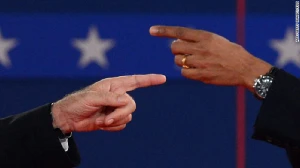I was having a discussion recently with a city council member about our Civinomicon event coming up in November. He was really excited about the event format, the whole idea of breaking off into small groups and pitching ideas seemed like a really important exercise to him. Unfortunately, he became dismayed when I mentioned who was going to be facilitating these small group sessions: staff. City and county staff, mind you.
At first I didn’t understand, who else was qualified enough to facilitate these groups? Journalists…? Maybe, but I’ve found that they usually hate dealing with people. And I seriously doubt they are going to hang around all day talking about obscure sections of a housing ordinance. So what was wrong?
“It’s not that they aren’t qualified” he said. “It’s just that they might limit any new ideas coming forward. Staff are pretty much paid to say no.”
“Huh…” I thought. “Maybe you have a point there, I don’t want people to feel dejected.” And I left the conversation somewhat dismayed myself.
But the more I thought about it afterward the more I realized that was actually really important: a lot of times we as citizens need to be told “no”. In fact, that is an essential part of the civic process. People need to understand that most ideas won’t work, which is why the ones that do are so necessary.
The reality is that most people are relatively uninformed. Most people aren’t civil engineers and most people don’t know section 5b of the scoping plan for the California Environmental Quality Act. And that’s ok, staff do. It’s their job. They actually went to school for this. Bureaucrats and administrators, by and large, are really knowledgable about their fields, to such an extent that any conversation about that topic would be incomplete without their presence.
Now I am not saying that people shouldn’t try to think of new ideas (my career is actually dependent upon that element of participation), but that we should get as many ideas out there as possible with the assumption that 98% won’t make the cut. That’s a conversation we need to have. Sure it can be humbling, but in the long run it saves time, money and provides a more well rounded perspective for next time.
Furthermore, studies have shown that people are much more likely to support something, even if they vehemently disagreed with it initially, so long as they were part of the discussion. For instance a recentstudy about South American Elections found that people who vote in presidential elections report greater life satisfaction than those who do not. They confirm the sense that it is the opportunity to vote rather than voting behavior that is significant. Legitimacy, in terms of process management, really does make a difference. Who would have thought, right?
But again, we are so used to oppositional nature of politics, and government in general, that we forget that’s actually how we solve problems in our day-to-day life. We know that it’s ok to disagree with someone, or something, without having to partisanly label it, sabotage it, or take it personally. We need to trust that the healthy competition of ideas will garner success. And we need to embrace the act of saying “no”.






Leave a Reply
You must be logged in to post a comment.